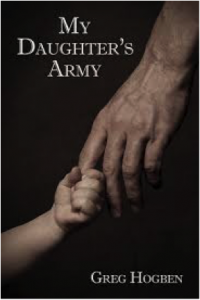By Christiana Paradis, brought to you by Powered By Girl
I just finished reading My Daughter’s Army by Greg Hogben and the moment I put it down my heart was pounding—I just wanted more! It’s honestly taken me several days to fully put all of my thoughts about this book together and write the review that it deserves. The book follows Adam Goodwin, an attorney, who finds a baby abandoned in a train station. Goodwin goes on to adopt and single parent the child, Sera. As she ages Sera becomes an international advocate for women’s equality and her dad remains her number one supporter through it all. Here’s a quick run-down of a few of the reasons why I loved it and why feisty feminists everywhere will want to snag a copy!
- Hooray for representations of healthy masculinity! This book is told from the perspective of Adam Goodwin, who is a father raising a sweet, caring, and loving daughter who will stop at nothing to improve the lives of women around the world. In presenting the book like this, it highlights the topic of single fatherhood, which is often overlooked. Adam finds Sera abandoned at a train station and takes on the responsibility of raising her along with his brother and three female neighbors. Additionally, Adam’s character never hesitates to express the true love that a father possesses for his daughter. We hear so much about the problems of toxic hypermasculinity and the ways in which it works to stifle male emotion. This book does the opposite. It presents the true beauty of healthy masculinity and particularly this father’s never-ending duty to support his daughter in any way that he can to help her achieve her mission.
- Not another gay tragedy! Adam Goodwin is a gay single father. The way in which his sexuality is referred to is monumental for two reasons. First, Adam’s sexuality is not the main focus of the book, in fact it is only mentioned in reference to the loss of his partner. Thus, his character’s sexuality is presented just as normally as any other heterosexual character. Often when LGBTQ+ characters are included their sexual identity becomes their only. To the contrary,My Daughter’s Army presents sexuality as any other qualifying distinction and moves on. It was a breath of fresh air to see the normalization of an LGTBQ+ sexuality. Secondly, despite several upsets the character endures throughout the book, his sexuality is never a point of tragedy. Often LGBTQ+ characters endure tragic fates or are continually presented in stereotypical depictions. In this work, Adam’s sexuality is not a cause for depression or sadness, but rather just a piece of the character that is presented in a positive and empowering light, which is a drastic change from most novels.
- Feminism and Faith. Towards the middle to the end of the book religious connotations begin to make an appearance. (I hate spoilers so I will not tell you how or why.) At first, I was a little reluctant to this addition; however, it is integrated into the text in a way that the reader doesn’t feel forced into understanding or accepting the character’s religion in order to enjoy the work. The religion is presented mostly as non-denominational with Christian undertones. Additionally, once I had finished the book and reflected on it I actually realized that this integration helps reconcile some ever persisting ideas that feminism and LGBTQ+ issues automatically clash with ideas of religion. It was wonderful (even if you don’t have any particular religious affiliation) to see the integration of these two spheres of thought, coming together in a mainstream title.
- The US isn’t the center of the universe—International Feminist Representation and Inclusion! One of my favorite things about this book is that it integrates international feminist and women’s issues. It tackles everything from human trafficking to honor killings and it presents them in a way that is raw and real; yet takes into account cultural implications for the communities in which they are taking place. Often feminist works tend to stick to one particular issue or present third wave feminist issues only on a national level, this book goes above and beyond to include women’s issues on an international scale. THANK YOU!
- Powered By Girl! But finally–my absolute favorite thing about this book is that it highlights the amazing accomplishments that internet activism can have and it is entirely powered by girl! This book is a homage to all social justice activists working in the field and behind computer screens to make a difference in the lives of women around the world. It presents how internet activism can make a difference, but also encourage real action offline. The accomplishments and implications of Sera’s work throughout the text are a true testament to the work of feminist organizations like PBG and others around the globe. Sometimes work in this movement can be exhausting—this book put into perspective that we are making a difference and each day at a time, little-by-little, the world is becoming a better and safer place for women.
Please consider purchasing and reading My Daughter’s Army. You will not be disappointed!

